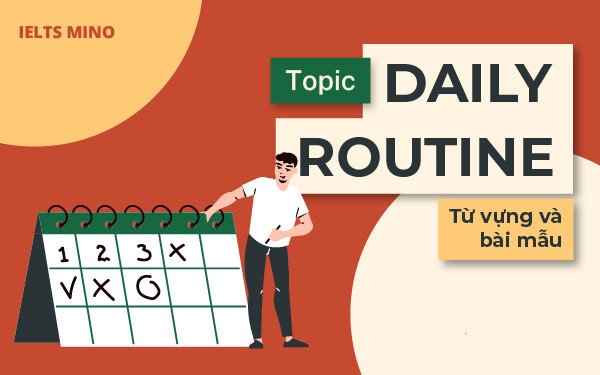Topic Daily Routine _IELTS Speaking Part 1
1. What is your daily routine?
My daily routine typically starts with waking up early and having a healthy breakfast. I then spend a few hours studying or attending classes. In the afternoon, I usually go to the gym or take a walk to stay active. Evenings are reserved for relaxing, having dinner with family, and reviewing my notes before going to bed.
2. Do you think it is important to have a daily routine for your study?
Yes, I believe it is crucial to have a daily routine for studying. A well-structured routine helps me stay organized and focused, ensuring that I allocate sufficient time for each subject. It also reduces stress and improves my overall productivity.
3. How do you organize your time of study?
I organize my study time by creating a schedule that breaks down my tasks into manageable chunks. I prioritize my assignments based on their deadlines and difficulty, and I use time-blocking to ensure I dedicate specific periods to each task. Additionally, I include short breaks to maintain concentration and avoid burnout.
4. What is the busiest part of the day for you?
The busiest part of my day is usually the morning. This is when I have most of my classes and study sessions scheduled. I find that I am more alert and productive during this time, so I try to tackle the most challenging tasks early in the day.
5. Do you usually have the same routine every day?
While I try to maintain a consistent routine, it does vary slightly depending on my schedule and priorities. For example, some days I might have more classes or need to spend extra time on a particular project. However, I always aim to include key activities like studying, exercising, and relaxation in my daily routine.
Từ vựng áp dụng
- Daily routine: thói quen hàng ngày
- Healthy breakfast: bữa sáng lành mạnh
- Studying: học tập
- Attending classes: tham dự các lớp học
- Stay active: duy trì sự năng động
- Relaxing: thư giãn
- Reviewing my notes: xem lại ghi chú
- Crucial: quan trọng
- Organized: có tổ chức
- Focused: tập trung
- Stress: căng thẳng
- Productivity: năng suất
- Schedule: lịch trình
- Breaks down: chia nhỏ
- Manageable chunks: phần có thể quản lý
- Prioritize: ưu tiên
- Deadlines: thời hạn
- Difficulty: độ khó
- Time-blocking: phương pháp chia thời gian
- Maintain concentration: duy trì sự tập trung
- Burnout: kiệt sức
- Alert: tỉnh táo
- Consistent routine: thói quen nhất quán
- Vary slightly: thay đổi chút ít
- Schedule and priorities: lịch trình và ưu tiên
- Particular project: dự án cụ thể
- Key activities: hoạt động chính
Topic Daily Routine _IELTS Speaking Part 2
Part 2: Describe your daily routine
- You should say:
- How do you start your day
- How long have you been following this routine
- Your favorite time and activity of the day.
- And explain what you do on a typical day of your life.
I would like to describe my daily routine, which I have been following for the past two years. I usually start my day quite early, around 6 AM. The first thing I do is practice mindfulness meditation for about 15 minutes. This helps me feel more focused and ready to tackle the day. After meditating, I have a healthy breakfast consisting of oatmeal, fruits, and a cup of green tea.
Once I’ve had my breakfast, I spend a couple of hours studying or working on assignments. This is usually my most productive time of the day, as I feel the most alert in the morning. Around midday, I take a break for lunch, often catching up with some light reading or chatting with friends.
In the afternoon, I attend any scheduled classes or engage in self-study. I also make sure to incorporate some physical activity into my routine, either by going to the gym or taking a long walk. This not only helps me stay active but also serves as a great way to clear my mind.
My favorite time of the day is the evening. After having dinner with my family, I usually relax by watching a movie or reading a book. This is my time to unwind and enjoy some leisure activities. Before going to bed, I review my notes and plan for the next day to ensure that I stay organized and prepared.
On a typical day, my routine helps me stay balanced and efficient. Each part of my day is designed to contribute to my overall well-being, from my mindfulness practice in the morning to my leisure time in the evening. I find that having a consistent routine makes me more productive and helps reduce stress, allowing me to handle my responsibilities more effectively.
Từ vựng áp dụng
- Mindfulness meditation: thiền chánh niệm
- Tackle: giải quyết
- Oatmeal: bột yến mạch
- Green tea: trà xanh
- Assignments: bài tập
- Midday: giữa trưa
- Catching up: cập nhật
- Light reading: đọc nhẹ nhàng
- Self-study: tự học
- Physical activity: hoạt động thể chất
- Clear my mind: làm cho đầu óc thư thái
- Unwind: thư giãn
- Leisure: giải trí
- Balanced: cân bằng
- Efficient: hiệu quả
- Well-being: sức khỏe tổng thể
- Consistent: nhất quán
Topic Daily Routine _IELTS Speaking Part 3
Is it hard to change a habit?
Yes, changing a habit can be quite challenging. Habits are ingrained behaviors that become part of our routine, often performed subconsciously. It requires a significant amount of willpower and consistency to break old habits and establish new ones. Additionally, the process can be mentally exhausting and time-consuming, as it often involves reprogramming one’s mindset and daily routine. However, with determination and a well-structured plan, it is certainly possible to change a habit. Support from friends and family can also play a crucial role in successfully altering long-standing behaviors.
Do you think it is good to have a 9-to-5 job?
There are both advantages and disadvantages to having a 9-to-5 job. On the positive side, such jobs typically offer stability and a predictable schedule, allowing individuals to plan their personal lives more effectively. A regular work schedule also provides a clear work-life balance, which can be beneficial for mental health. However, some people might find the routine monotonous and restrictive, especially if they thrive on variety and flexibility. Ultimately, whether a 9-to-5 job is good depends on an individual’s personal preferences, career goals, and lifestyle.
Why do some people don’t plan their day in advance?
There are several reasons why some people do not plan their day in advance. One reason could be a preference for spontaneity and the flexibility to adapt to unexpected changes. Others might find planning overwhelming or feel that it adds unnecessary pressure to their daily lives. Additionally, some individuals might believe that they are more productive when they go with the flow rather than sticking to a rigid schedule. Lack of organizational skills or previous negative experiences with planning can also deter people from creating a structured daily plan. Ultimately, personal habits and mindsets play a significant role in whether someone chooses to plan their day.
Từ vựng áp dụng
- Ingrained behaviors: hành vi đã ăn sâu vào tiềm thức
- Subconsciously: một cách vô thức
- Willpower: nghị lực
- Consistency: tính kiên định
- Mentally exhausting: mệt mỏi về tinh thần
- Reprogramming one’s mindset: thay đổi tư duy
- Well-structured plan: kế hoạch được tổ chức tốt
- Stability: sự ổn định
- Predictable schedule: lịch trình có thể dự đoán
- Work-life balance: cân bằng giữa công việc và cuộc sống
- Monotonous: đơn điệu
- Restrictive: hạn chế
- Thrive on: phát triển mạnh nhờ
- Spontaneity: tính tự phát
- Flexibility to adapt: sự linh hoạt để thích nghi
- Overwhelming: quá tải
- Unnecessary pressure: áp lực không cần thiết
- Go with the flow: thuận theo tự nhiên
- Rigid schedule: lịch trình cứng nhắc
- Organizational skills: kỹ năng tổ chức
- Negative experiences: trải nghiệm tiêu cực
- Deter: làm nản lòng
- Structured daily plan: kế hoạch hàng ngày có cấu trúc
- Personal habits: thói quen cá nhân
- Mindsets: tư duy





0 Lời bình